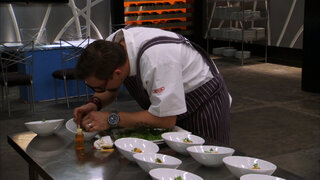The Generation Gap
Despite their similar age, Ruth sees radical differences in what Kerry and Chris believe a restaurant owes its patrons.

If we’d scripted this, we couldn’t have come up with a better finale. This isn’t just two chefs battling it out, this is two world views, two entirely different notions of what it means to be a chef. And despite the relative closeness in their ages, as you watch this you sense that you are watching two entirely different generations debating the question of what a restaurant owes its patrons.
The lines are drawn right from the beginning. Kerry, classically trained and French-focused, hones in on technique, sacrificing the quality of ingredients for the time to transform them. Chris, on the other hand, is a twenty-first century chef who believes the quality of ingredients trumps everything. As we watch Chris running from shop to shop, gathering great ingredients, Kerry’s already in the kitchen, meticulously taking them apart.
The contrast becomes even more pronounced as they begin preparing their dishes. Kerry goes for luxurious richness, for amiable food that will seduce and comfort his patrons. Meanwhile Chris is pouring out buckets of blood, intent on challenging his diners with dishes designed to jolt them right out of their comfort zones. The love letters the chefs created as a first course were both wonderful, but it’s worth noting that Kerry’s jjigae is toned down, muted, as if he’s afraid of offending his diners with true Korean heat, while Chris takes the opposite tack. Love me or leave me. Here’s my heart on a plate; it’s topped with puffed tendon. Now eat it raw!

The one moment when the chefs pursue a parallel path is when they are apologizing. They’re both mature enough to know that an apology is all about the other person, and their dishes show certain similarity. Each offers us something soft, sumptuous, luxurious and delicate -- and it works. Serve me either one of these dishes? I’ll forgive you almost anything.
Then we get to the thank you, and we’re right back to differing world visions. Kerry’s bronzino is unsurprising, technically adept, familiarly delicious. Chris’ tripe is something else. This is tripe so soft and sensuous it would make a tripe-lover out of the most fanatic offal-phobe. It is, hands down the best tripe I’ve ever eaten, and I know this: Wherever she is, Grandma Rosalie is smiling.
Finally we come to the letter to themselves, and we’re almost back to the beginning: the difference between these two could not be more pronounced. Kerry’s out to please his patrons, sending out easy bliss. This is the least challenging food you could possibly offer an American audience. It’s the dish every chef puts on the menu for the salesman from the midwest, the man who cringes at eating adventures. Then along comes Chris, offering us his heart on a plate in a slightly different form. Most Americans recoil at the notion of eating sausages made of blood, but pow! bam! that’s what we’ve got here. Chris plops that big brown sucker onto the plate next to a naked pile of pork-poached oysters. It’s not pretty, but it’s a joy to eat and an extremely bold move.
Given another set of judges, it could easily have gone the other way. But we rewarded sheer audacious deliciousness. We want our Master Chefs to have the courage of their convictions, and I’m proud that this year’s Top Chef Master is someone who pushed the envelope all season long. Chris is a chef who’s looking straight into the future, and I can’t wait to see what he does next.
And can we please hear it for Francis Lam, and what might be the most wonderful description of a dish ever recorded on tape? Only he could describe pork-poached oysters like this: “It’s like you took a swim in the ocean, you’re doing the backstroke, the sun is hitting you, you’re feeling good. And all of a sudden a pig comes along and gives you a backrub.” Wow.



